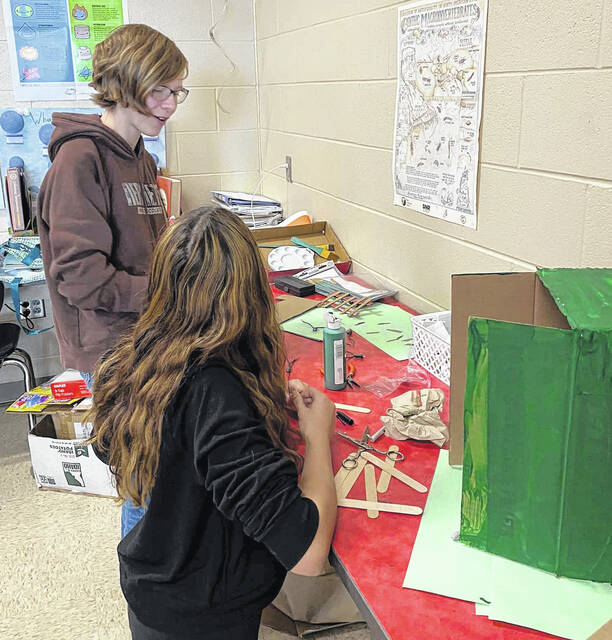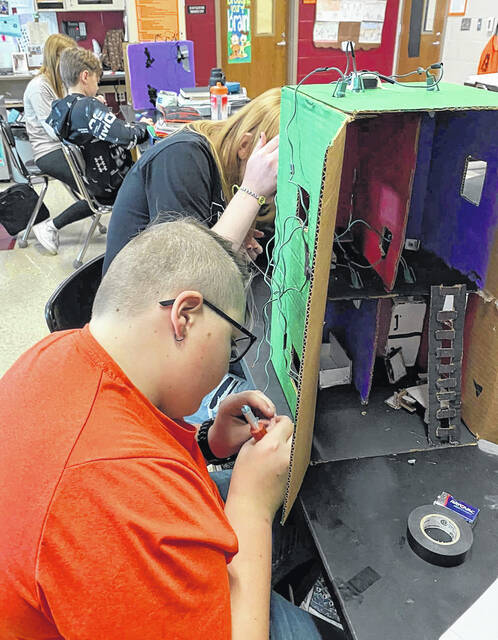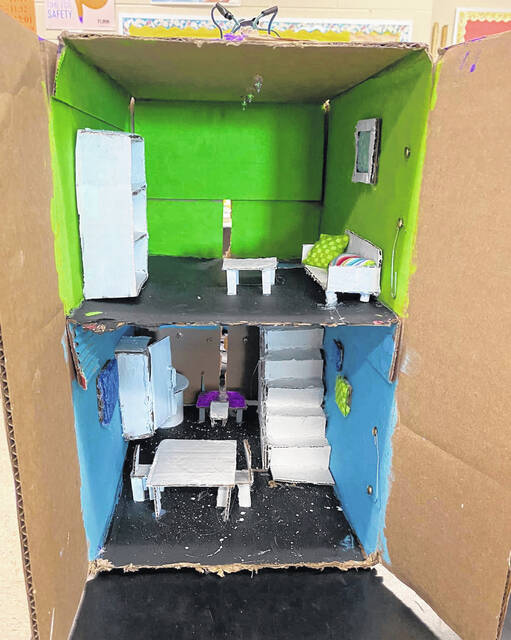
Mrs. Bowser described just some of the skills students practiced during the electric house project, “They were learning how to work together, time management, decorating skills, and how to make a circuit with a parallel and series circuit.”
Arcanum Middle School Facebook photo

The Olympiad science class is an excellent choice for kinesthetic kids, the ones with the most hands-on learning style, giving them an opportunity to learn by doing.
Arcanum Middle School Facebook photo

Students designed and wired their own miniature houses that had to include a series and parallel circuit with lights operated by a switch.
Arcanum Middle School Facebook photo
By Dawn Hatfield
DailyAdvocate.com
ARCANUM — “Don’t tell me, show me.” Former long-time Google CEO, Eric Schmidt, can’t possibly be the first person to ever utter this phrase, though he is arguably one of the most successful. Maybe Schmidt was a kinesthetic learner like so many students today are, a person who learns by doing. Maybe Schmidt would have taken Mrs. Bowser’s Olympiad science class if he’d had the chance.
Students in the Olympiad class at Arcanum-Butler Middle School have recently finished an awesome project that allowed them to develop real-life, hands-on skills. It’s the project one student, Aiden Carlisle, designated “the most fun project we’ve had so far.” Students designed and wired their own miniature houses that had to include a series and parallel circuit with lights operated by a switch.
Olympiad teacher, Nicki Bowser, described her class in this way, “It is a science class that is an [additional] elective for the students, but basically, it’s a ‘hands-on science class.’ I get to teach many different topics and use project learning or STEM-related items. In a typical science class, I have to follow the state standards for that particular grade, but in this class, I can teach any of the science standards, plus many topics that are not in the standards anymore.”
Bowser described just some of the skills students practiced during the electric house project, “They were learning how to work together, time management (they had a deadline), decorating skills (they had to make furniture out of any material they wanted), and how to make a circuit with a parallel and series circuit.”
Bowser developed the project idea after doing research online. Students invested about two and a half weeks on their houses.
Haiden Vencill, a student who worked on the electric house project admitted, “Electricity is very confusing until you get the hang of it.”
Caleb Wiant agreed, “This project gave my brain a workout because you have to figure out where all the wires go.”
The best thing about a class like Bowser’s is that it caters to those kinesthetic kids, the ones with the most hands-on learning style, giving them an opportunity to learn by doing. The learning-by-doing theory of education is not new. It was proposed by American philosopher John Dewey in the late nineteenth century.
In an education world that focused primarily on teaching students how to do well at university, Dewey saw a need for a different approach. He implemented his ideas by setting up the University of Chicago Laboratory School (UCLS) for students in nursery school to 12th grade. Managed today by a combination of the philosophy, psychology, and education departments, Dewey’s teaching and learning styles promoted at UCLS have been vital to progressive education, a learning style rooted in experience.
In Dewey’s 1897 article, “My Pedagogic Creed,” he stated, “I believe that the school must represent present life — life as real and vital to the child as that which he carries on in the home, in the neighborhood, or on the playground.”
Most progressive education programs have many qualities in common, an emphasis on learning by creating and doing. Progressive education often uses an integrated curriculum with thematic units and involves a strong emphasis on problem solving and critical thinking. Collaboration and cooperative learning projects offer a platform for social responsibility and democracy in addition to educational standards. The best of these programs also select subject content by looking forward to ask what skills will be needed in future society. Overall, progressive education emphasizes lifelong learning and social skills while challenging students and allowing them to have fun.
Olympiad student, Bohdan Menzie, summed it up in one simple but meaningful statement in regard to the hands-on project in Mrs. Bowser’s class, “I feel like I could wire a house now.”
Dawn Hatfield covers education stories for The Daily Advocate. Have a school-related event to share? Reach out by email at [email protected] or by phone at 937-569-0066.

